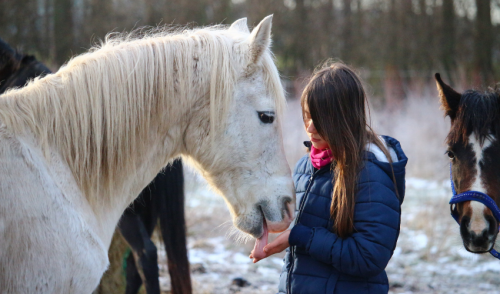{article.name}
Stay Informed
Your Aging Horse: Winter Horse Care

- Share this:
- Share on Facebook
- Pin on Pinterest
- Tweet on Twitter
Winter can be a stressful season even for a horse in its prime. Older horses are even more vulnerable and need some special care considerations to stay healthy and comfortable through the winter.
How Senior Horses Have Different Needs
It can be difficult to decide when an individual horse has reached its senior years. Just how healthy a horse is, how hard it has worked, what care it has received, where it lives, and the general stresses of life all contribute to a horse’s age beyond the calendar, but in general any horse age 15 or older is considered a senior. Horses can live to be 25-30 years old, however, so a senior horse could have many years left that require specialized care.
Health complications more prominent among senior horses include…
- Lost or worn teeth, misaligned teeth, or other dental issues
- Reduced immunity to parasites, worms, and infections
- Abnormal hormone function that can affect coat, muscle mass, and foot health
- Decreased or less efficient nutrient absorption, leading to weight loss
- Greater sensitivity to stress, including strangers, changing locations, etc.
These health concerns can make senior horses more vulnerable in winter, but with the proper care even older horses can thrive through the coldest season.
Winter Care for Senior Horses
All horses require special care to stay safe, comfortable, and happy in winter, but the extra considerations for aging horses may require even further accommodations, such as…
- Specialized Feed – Older horses with dental problems may eat better if they have pelleted or chopped feed. Adjusting the nutritional balance of the feed can also help ensure they get proper nutrition for their age and activity levels.
- Gentle Exercise – Cold weather can exacerbate arthritis and other joint conditions in older horses. Staying active and mobile with gentle exercise can help keep the animal healthy and comfortable. Consider exercising in an arena to avoid overchilling in the winter.
- Blankets – Senior horses may have thinner coats or bare patches and could use blankets with neck covers to stay warmer. Check the horse regularly for rain rot, however, to ensure they are dry and clean or else they may suffer from skin infections under an improper blanket.
- Accessible Shelter – Providing a windbreak or three-sided shelter for outdoor horses in cold weather will give senior horses an easy place to stay comfortable when the weather turns poor. The shelter should have enough space and be easy for the animals to access.
- Indoor Shelter – Consider providing indoor accommodations for senior horses through the winter to ensure they are comfortable and safe from the worst weather. This will eliminate severe temperature changes that older horses cannot adjust to.
- Adequate Ventilation – If horses are stabled in winter, they must have suitable air circulation to control humidity and minimize the risk of respiratory problems. While strong drafts should be avoided, some air circulation is essential to keep horses breathing easy in winter.
- Liquid Water – Horses need plenty of water to aid digestion and control their body temperature, and senior horses especially could develop impaction colic and other difficulties if they become dehydrated. Use heated troughs or buckets to ensure enough water is available.
- Secure Footing – An older horse that slips and falls could more easily break bones, strain tendons, or get cuts that could get infected. Control mud and ice in any place the horse will be standing or walking to be sure its footing is secure and the risk of slips is minimized.
- Deworming – Regular deworming and other parasite control should be continued through the winter to keep older horses in good condition. This will help keep any infestations from growing to unmanageable proportions that could endanger the animal’s health.
- Hoof Care – Older horses may not wear down their hooves as quickly on a daily basis, and regular trims will be necessary to keep their feet in good condition. Picking will also be necessary to keep snow and ice from building up on the horse’s feet, and warm poultices can help with comfort and protecting against infections.
Above all, pay close attention to senior horses all through the winter. Watch for signs of distress, discomfort, or illness, and have the animal checked and attended to immediately to keep any difficulties from progressing. With proper care, even an older horse can be comfortable, healthy, and safe all winter long, ready for another rejuvenating spring.
Special Offers
We are constantly adding new specials to our site. Be sure to check back often!


Comments